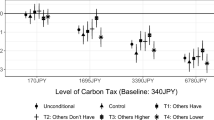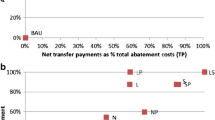Abstract
This paper explores the conjecture whether the Leviathan motive of politicians — to tax for the purpose of raising revenues rather than for benevolent, Pigovian motives — helps to overcome the inefficiency of international pollution spillovers such as in the cases of acid rain and global warming. It turns out that this conjecture is true in a static context that captures flow externalities, e.g., acid rain, as long as environmental damages are not too high. In contrast, Leviathan motives aggravate the already existing inefficiency in the case of stock externalities (e.g., global warming) despite probably high taxes at the beginning.
Similar content being viewed by others
References
Tamer, B. and Olsder, G.-J. (1982). Dynamic noncooperative game theory. London: Academic Press.
Geoffrey, B. and Buchanan, J.M. (1980). The power to tax: Analytical foundations of a fiscal constitution. Cambridge: Cambridge University Press.
Cline, W.R. (1991). Scientific basis for the greenhouse effect. Economic Journal 101: 904–919.
Dornbusch, R. and Poterba, J.M. (Eds.) (1992). Global warming, economic policy responses. Cambridge: MIT Press, 2nd edition.
Hartwick, J.M. and Yeung, D.Y.K. (1994). The tragedy of the commons revisited. Mimeo. Queen's University.
Hoel, M. (1993). Intertemporal properties of an international carbon tax. Resource and Energy Economics 15: 51–70.
Manne, A.S. and Richels, R.G. (1991). Global CO2 emission reductions — The impacts of rising energy costs. The Energy Journal 12(1): 87–107.
Mueller, D.C. (1989). Public Choice II. Cambridge: Cambridge University Press.
Mehlmann, A. (1988). Applied differential games. New York/London: Plenum Press.
Nordhaus, W.D. (1991). To slow or not to slow: The economics of the greenhouse effect. Economic Journal 101: 920–937.
Nordhaus, W.D. (1993). Optimal greenhouse-gas reductions and tax policy in the "DICE" model. American Economic Review 83 (May): 313–317.
Reynolds, S.S. (1987). Capacity investment, preemption and commitment in an infinite horizon model. International Economic Review 28: 69–88.
U.S. Congress (1991). Office of Technology Assessment, Changing by degrees, OTA-O-482, Washington DC: U.S. Government Printing Office.
Wirl, F. and Dockner, E. (1995). Leviathan governments and carbon taxes: Costs and potential benefits. European Economic Review 39: 1215–1236.
Author information
Authors and Affiliations
Additional information
A preliminary version of the paper was part of a presentation at the Annual European Meeting of the Public Choice Society in Valencia, Spain, April, 6th–9th, 1994. I acknowledge helpful comments and suggestions from an anonymous referee, the discussions with participants in Valencia and the support by Anne Barnett.
Rights and permissions
About this article
Cite this article
Wirl, F. Can Leviathan governments mitigate the tragedy of the commons?. Public Choice 87, 363–377 (1996). https://doi.org/10.1007/BF00118654
Accepted:
Issue Date:
DOI: https://doi.org/10.1007/BF00118654




